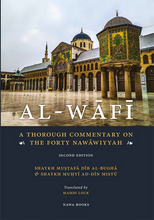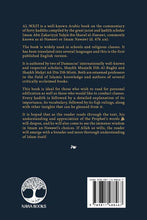Profits go towards supporting the educational & community projects at the Guidance Hub.
Al-Wafi is a well-known Arabic book on the commentary of forty ḥadīths compiled by the great jurist and ḥadīth scholar Imam Abū Zakariyyā Yaḥyā ibn Sharaf al-Nawawī, commonly known as al-Nawawī or Imam Nawawī (d. 676 AH).
The book is widely used in schools and religious classes. It has been translated into several languages and this is the first published English version.
It is authored by two of Damascus’ internationally well-known and respected scholars, Shaykh Muṣṭafā Dīb Al-Bughā and Shaykh Muḥyī Ad-Dīn Dīb Mistū. Both are esteemed professors in the field of Islamic knowledge and authors of several critically acclaimed books.
This book is ideal for those who wish to read for personal edification as well as those who would like to conduct classes. Every ḥadīth is followed by a detailed explanation of its importance, its vocabulary, followed by its fiqh rulings, along with other insights that can be gleaned from it.
It is hoped that as the reader reads through the text, his understanding and appreciation of the Prophet’s words ﷺ will deepen, and he will also come to see the immense wisdom in Imam an-Nawawī’s choices. If Allah so wills, the reader will emerge with a broader and more thorough understanding of Islam itself.
‘I saw that I should gather forty ḥadīths that are more important than all of them, and they are forty ḥadīths that comprise all of that, each one being an immense foundation of the Religion and the scholars have described it by saying that Islam revolves around it, or it is half of Islam or a third of it, and so forth.’
Imam Abu Zakariya Yahya al-Nawawi
‘We were then determined to write a commentary on The Forty of Imam an-Nawawī, and add the fifty-first commentary to the other commentaries on these blessed ḥadīths, not so that it would be forgotten on old library shelves and become tasty food for insects and dust. Rather, we wanted it to become, with Allah’s permission, printed letters, words, and pages, so that it reaches the Muslim reader in the easiest script, the clearest method and the most beautiful garb.’
Shaykh Muṣṭafā Dīb Al-Bughā & Shaykh Muḥyī Ad-Dīn Dīb Mistū
- Paperback - 447 pages
- By - Shaykh Muṣṭafā Dīb Al-Bughā & Shaykh Muḥyī Ad-Dīn Dīb Mistū
- Translated by - Mahdi Lock
- Published - December 2020
- ISBN - 9789811488467
About the Authors:
He is the beloved scholar, Prof. Dr Muṣṭafā Dīb al-Bughā al-Maydānī ad-Dimashqī ash-Shāfiʿī, born in the year 1938M/1354AH in the district of Maidan in the city of Damascus, Syria. He specialised in Comparative Fiqh and the methods used in judging evidence according to different madhhabs. Amongst his teachers were Imam Hasan Habanakah al-Maidani and his students Khairu Yasīn al-Maydānī, Hāni al-Mubarak, Ḥusayn Khaṭṭāb, and Muḥammad Kurayyim Rājih while he was in Damascus.
Shaykh Muṣṭafā al-Bughā has authored and commented upon numerous books on numerous areas in fiqh and is well-respected throughout the Muslim world for his deep knowledge and charisma in discussing intricate matters. He has taught and lectured in many different Universities throughout the world, which includes, Qatar, Jordan, Malaysia, and Dagestan.
To date, Shaykh Muḥyī ad-Dīn has either authored or co-authored eighty-two written publications of books and research papers. Most of his books are well known and used in Islamic institutions and universities throughout the world. While the majority are written in Arabic, there are some that are translated into Malay, French and Urdu.



